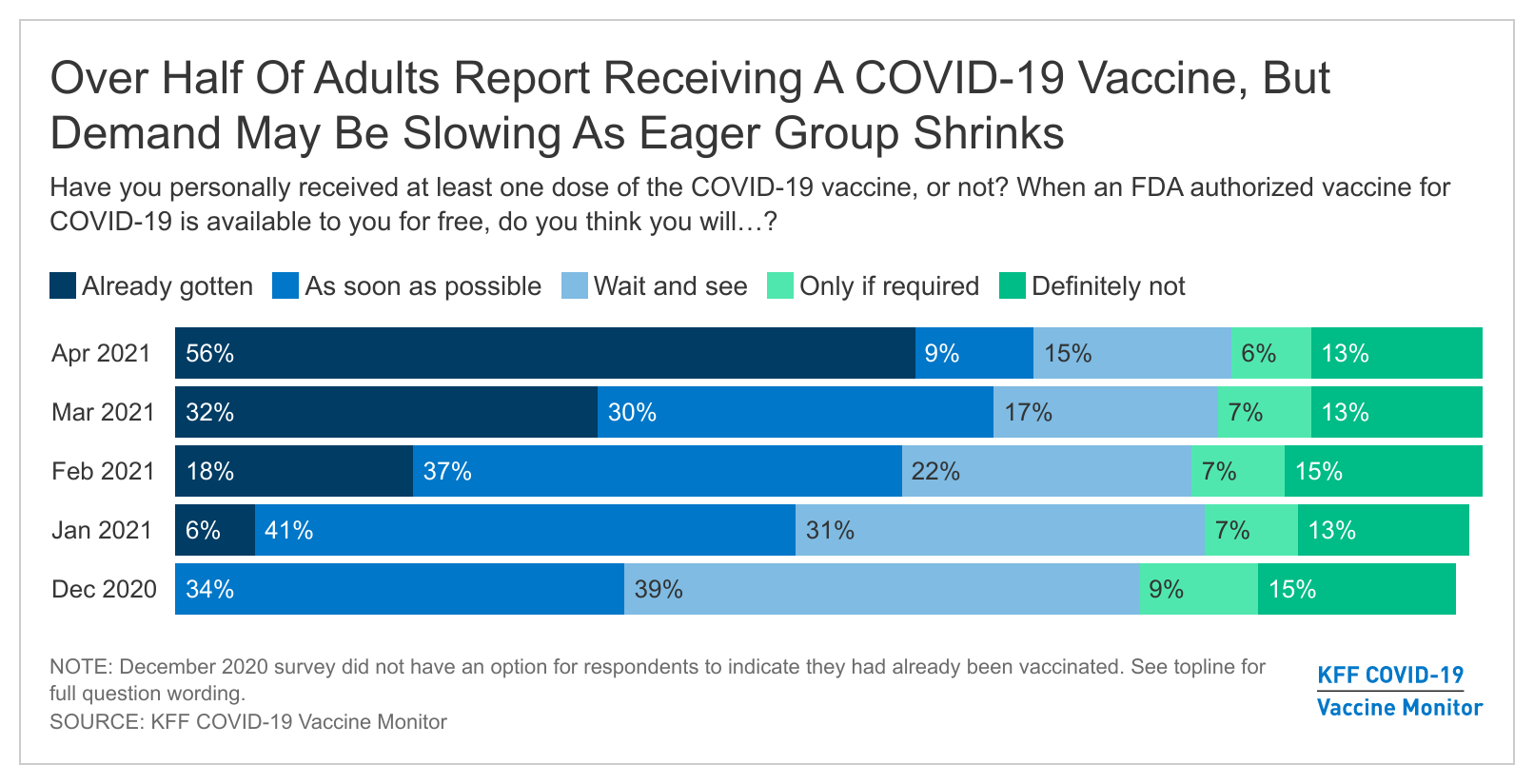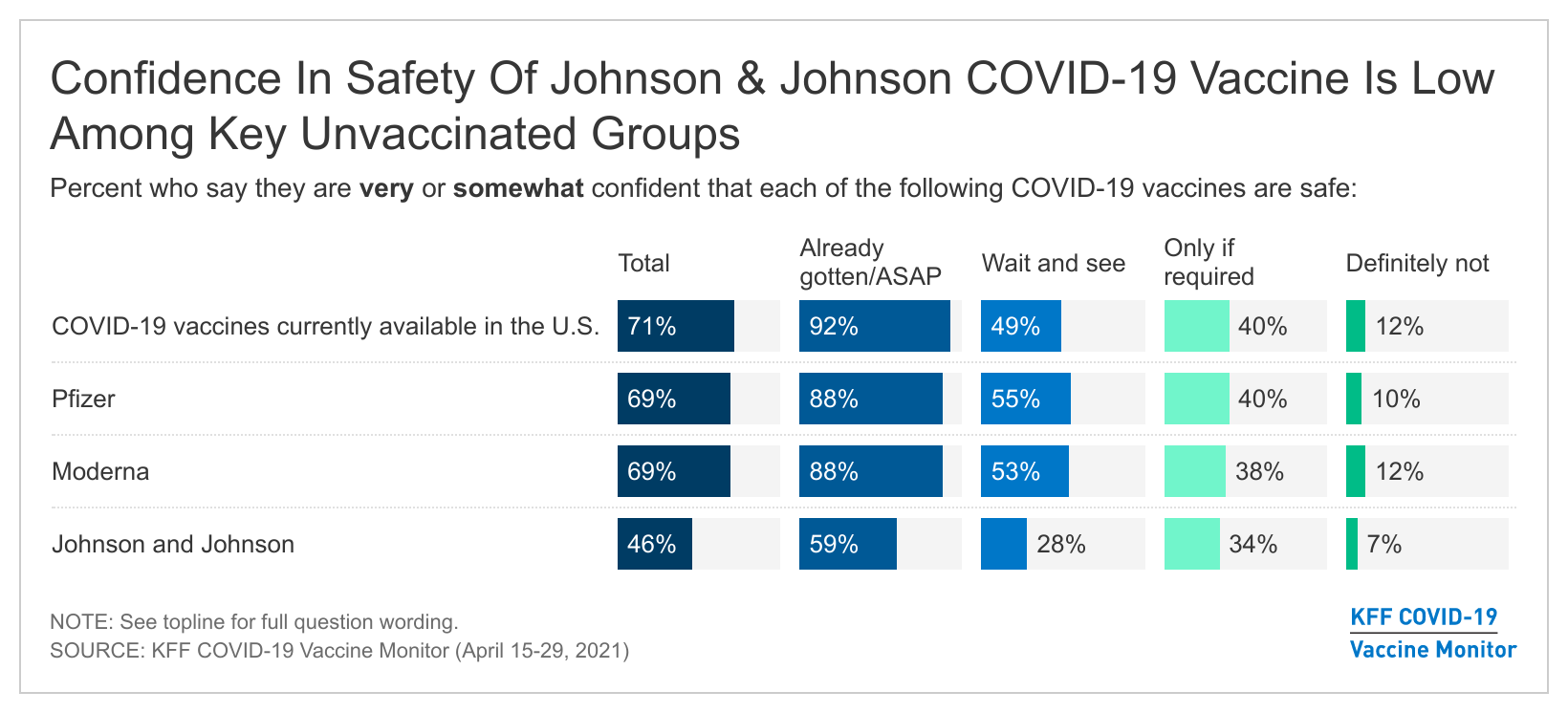
The independent source for health policy research, polling, and news.
Vaccine Monitor: Eagerness to Get Vaccinated Begins to Level Off as Most People Who Want a Vaccine Have Gotten One; But Republicans Show Biggest Shift Toward Vaccination
Confidence in Safety of Johnson & Johnson’s Vaccine Lags Others After 10-Day Pause; More Women Express Concerns about Side Effects
Parents’ Eagerness for Their Children to Get Vaccinated Mirrors Their Own Intentions, with 3 in 10 Ready to Vaccinate Their Children as Soon as It’s Available
Most adults (56%) nationally say they have gotten at least one dose of a COVID-19 vaccine, and few (9%) say they haven’t but want to do so right away, posing a new challenge for the nation’s vaccination efforts, the latest KFF COVID-19 Vaccine Monitor shows.
With all adults now eligible to get a vaccine nationwide, the share who say they have been vaccinated rose sharply over the past month (from 32% to 56%), while the share who hope to do so as soon as possible fell by a similar margin (30% to 9%).
Combined, this most enthusiastic group increased only slightly from 61% in March to 64% now, suggesting that increasing vaccination rates beyond that point will require converting other people who are less enthusiastic and that vaccination rates may only inch forward from this point on.
Movement was seen for one of the groups with a large share of individuals still reluctant to get a COVID-19 vaccine, Republicans. A majority (55%) now say they have already gotten a shot or intend to do so as soon as possible, compared to 46% in March, and another 14% want to “wait and see.” One in five (20%) still say they definitely will not get vaccinated. That is down from 29% in March, though it is still higher than the share among Democrats (4%) or independents (13%).
The Monitor now shows 15% of adults say they want to “wait and see” how the vaccine works for others before getting one, little changed from March (17%), and another 6% who say they would get vaccinated only if required for work, school or other purposes. An additional 13% who say they will “definitely not” get vaccinated, also largely unchanged since March.
“The fact that a majority of Republicans are or want to get vaccinated, and fewer of them are a definite no, shows that progress is possible among the most reluctant groups, even if the process of moving from no to yes is a slow one,” KFF President and CEO Drew Altman said.
Lack of information remains a barrier for many unvaccinated people, particularly Hispanic adults. About 3 in 10 (29%) overall, and 42% of Hispanic adults, say they are not sure whether they are eligible to get a vaccine in their state even though all adults are now eligible.
Most (88%) of those who have not yet been vaccinated say they have not made an appointment to do so. When asked why not, those in the “wait and see” category most often cite the desire to see more people get the vaccine (23%) and concerns about safety and side effects (14%). In contrast, those who want to get it “as soon as possible” but haven’t yet made an appointment most often cite logistical concerns and information needs.
When those who say they will “definitely not” get a COVID-19 vaccine are asked if there is anything that might convince them to change their mind, 72% say “no.” The others give a variety of responses, with the most common response being if more research were done on the vaccines.
“People who have not gotten a COVID-19 vaccine at this point give a variety of reasons ranging from safety concerns to lack of information to problems with vaccine access,” KFF Executive Vice President Mollyann Brodie said. “There is no one-size-fits-all approach to reaching these different groups, and a variety of strategies will be needed.”
Confidence in the Safety of the J&J Vaccine Lags Other Vaccines After 10-Day Pause Over Blood Clots
After federal authorities paused the use of the Johnson & Johnson vaccine for 10 days in April over concerns about rare blood clots, the public is significantly less confident in its safety than in the two other COVID-19 vaccines also available now in the U.S.
While most people have at least some confidence in the safety of COVID-19 vaccines overall (71%), and in the Pfizer and Moderna vaccines (69% each), less than half (46%) say they have confidence in the safety of the Johnson & Johnson vaccine.
Among those who say they want to “wait and see” before getting vaccinated, 28% say they are confident in the Johnson & Johnson vaccine’s safety. Those who have not yet gotten a COVID-19 vaccine are less likely than those that have to express confidence in the safety of the vaccines across the board.
About 1 in 5 unvaccinated adults say the news caused them to change their mind about getting a COVID-19 vaccine, including 9% who say it made them less likely to want the Johnson & Johnson vaccine, 7% who say it made them less likely to want any COVID-19 vaccine, and 4% who say it changed their thoughts about the vaccines in some other way.
Among Hispanic women, 39% say it changed their minds, including 15% who say it made them less likely to want the Johnson & Johnson vaccine and 18% who say it made them less likely to want any COVID-19 vaccine.
Concerns about side effects from the COVID-19 vaccines are on the rise more broadly. Among those not eager to get vaccinated, this month 81% say they are concerned they might experience serious side effects from the vaccine, up from 70% last month. Among women, 92% now say they are concerned about side effects, up from 77% last month.
Even with these increased concerns, the trajectory of vaccine enthusiasm does not appear to have slowed disproportionately among women over the past month. Two-thirds (66%) of women say they’ve been vaccinated or will do so as soon as possible, compared to 63% of men.
Most Parents Eager to Get a Vaccine Themselves are also Eager to Vaccinate Their Children When Able
The Pfizer vaccine is now available to 16- and 17-year-olds and could be approved for use in children ages 12-15 as early as next week, while studies are underway to assess all the vaccines’ safety and effectiveness in younger children. When it becomes available, the latest Monitor report suggests that parents’ eagerness to get their own children vaccinated largely mirrors their views about the vaccine for themselves.
Three in 10 parents of children between the ages of 12-15 say they’ll get their child vaccinated right away once a COVID-19 vaccine is authorized and available for their child’s age group. One quarter (26%) say they’ll wait a while to see how the vaccine is working before getting their child vaccinated, 18% will only get their child vaccinated if the school requires it and 23% say they definitely won’t get their child vaccinated.
Among parents of children under age 18 who are already vaccinated or hoping to get a vaccine as soon as possible, most say either that they will get their children vaccinated right away (48%) or wait a while to see how it’s working (29%). Among parents in “wait and see” themselves, 63% say they will also wait and see before getting their child vaccinated. And most (58%) parents who say they will definitely not get vaccinated or will only do so if required say they will definitely not vaccinate their children.
Other key results include:
• Among those not eager to get a vaccine, 30% say they would be more likely to get one if it were offered to them where they normally go for healthcare, and a similar share (29%) say they would be more likely if they only needed a single dose of a vaccine.
• Similarly, 30% of those not eager to get vaccinated as soon as possible say they would be more likely to do so if airlines required vaccinations to fly, and nearly as many (26%) would be more likely if it were required to attend large gatherings such as sporting events and concerts. Young adults are more likely than older ones to say such requirements would encourage them to get vaccinated.
In addition, KFF will release a companion Vaccine Monitor report next week focusing on Hispanic adults.
Designed and analyzed by public opinion researchers at KFF, the KFF Vaccine Monitor survey was conducted from April 15-29 among a nationally representative random digit dial telephone sample of 2,097 adults, including oversamples of adults who are Black (507) or Hispanic (778). Interviews were conducted in English and Spanish by landline (298) and cell phone (1,799). The margin of sampling error is plus or minus 3 percentage points for the full sample. For results based on subgroups, the margin of sampling error may be higher.
The KFF COVID-19 Vaccine Monitor is an ongoing research project tracking the public’s attitudes and experiences with COVID-19 vaccinations. Using a combination of surveys and qualitative research, this project tracks the dynamic nature of public opinion as vaccine development and distribution unfolds, including vaccine confidence and acceptance, trusted messengers and messages, as well as the public’s experiences with vaccination.

